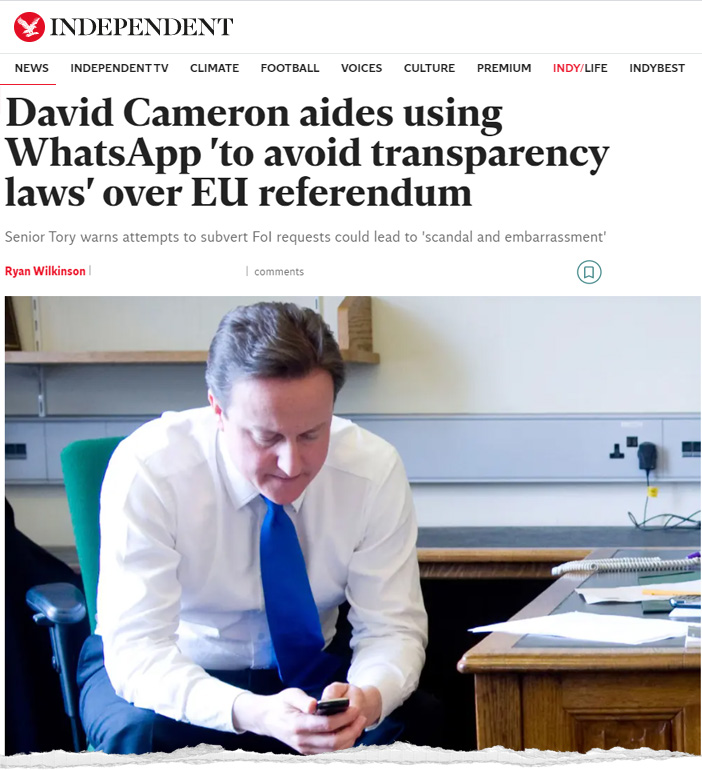The behavior of David Cameron, former Prime Minister of the United Kingdom dragged “lobbying” into the Westminster scandal gutter when he was acting for his fintech employer, Lex Greensill.
When Greensill was getting into financial trouble Cameron tried to secure government support by going through back channels to cabinet ministers and senior civil servants.
This information is known because journalists exposed the secret WhatsApp messages exchanged between former colleagues, including the chancellor, Rishi Sunak.
An ex-minister said they kept personal and official messages separate when they were in office. “You have to rely on people using their common sense,” they add. “Some ministers actually hand the work mobile across to be carried by a special adviser or a member of their team, so they’re not too close to it and don’t use it in an inappropriate way.
“You’ve also got to be careful as to whom you give your number out to.” Some in government have suggested the prime minister should be less willing to share his personal contact details.
Labour argues that the government’s use of messaging fosters “cronyism”, that those with ministers’ phone numbers have an unfair advantage over those who do not.
Moreover, any official government conversation between any two politicians or officials has to have a third party included or is to be reported to a secretary or another politician as soon as possible.
That is to ensure that the conversations are transparent within the government and there are no ulterior motives. Since there are times where politicians talk privately whether it is face to face or using any platform without reporting back, there has been talk about having a tightening to the rules to ensure transparency.
That would be that all government phones given to the politicians are to be tracked and all the messages are logged with the names of the people participating in the conversation. As much as the government wants to have end-to-end encrypted messages for their politicians to ensure no leaking of information, they also must have transparency between all their members.
Why Government Officials Need a Secure and Transparent Communication Platform
The Government sector is a prime target for cyber-attacks, and every year Governments increasingly add new technology to their daily operations.
To protect the continuous flow of sensitive information between workers using modern devices it is logical that government systems should be supported with a fit-for-purpose secure communications infrastructure.
More and more governments understand the importance of a system where each user can be strongly authenticated, and every message and interaction can be secured by end-to-end encryption.
Messages sent by employees via smartphones over unsecured applications, open telecoms networks, or unprotected enterprise solutions are much more vulnerable to cyberattacks.
Governments require a proven secure communication platform as the foundation for all important communications.
Messaging has become an integral part of the day-to-day life of most humans. It’s a faster, easier means of communication, that gets the message across to the other end without any hassle. But it comes with drawbacks- leakage.
Pravica is an end-to-end encrypted messaging app built with blockchain technology and secured by Bitcoin that is used to facilitate the secret communications of individuals, provide secure conversations without any third-party intervention, and prohibit the data to get leaked or misused or exfiltrated.

Having the Best of Both Worlds: Privacy + Transparency
Pravica’s tamper-proof Blockstack Naming System (BNS) allows governments and enterprises to establish a branded decentralized identity system utilizing Identity Management Blockchain technology. Every official or employee will have a unique ID with their personal name and the company name in such format: EmployeeName.CompanyName.id.
Since there is no central repository from which hackers can steal data, information stored on the blockchain is safe from data breaches that centralized databases frequently suffer from. Moreover, all transactions that happen between the identity holders and the governments or companies are recorded on the blockchain database layer, ensuring complete transparency and data ownership.



